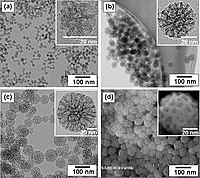
Photo from wikipedia
Interest has recently been rising in the development of food-compatible Pickering emulsions, i.e., particle-stabilized emulsions, and various biobased particles have been demonstrated as useful for such a purpose. Most of… Click to show full abstract
Interest has recently been rising in the development of food-compatible Pickering emulsions, i.e., particle-stabilized emulsions, and various biobased particles have been demonstrated as useful for such a purpose. Most of the related work has focused on the physical stability of the emulsions, but whether such particles can be advantageous in terms of chemical stability, and in particular, with regard to lipid oxidation, is largely unexplored. Recently, we found that colloidal lipid particles (CLPs) are efficient Pickering stabilizers, and the objective of the present study was to investigate the oxidative stability of emulsions stabilized with those particles. Three types of sunflower oil-in-water (O/W) emulsions were considered: Pickering emulsions stabilized with colloidal lipid particles (CLPs) made of high melting point (HMP) fat (tripalmitin or palm stearin), adsorbed onto the liquid oil droplets; and, as references, two conventional sodium caseinate-stabilized emulsions, of which one contained only liquid oil, and the other liquid oil mixed with HMP fat as the core of the emulsion droplets. In the presence of iron, the latter oxidized faster than conventional liquid oil and Pickering emulsions, resulting in 2- to 3-fold higher amounts of primary and secondary lipid oxidation products. This may be due to intra-droplet HMP fat pushing oxidizable lipids towards the oil-water interface, which would promote lipid oxidation. This shows that the localization of solid fat in O/W emulsions affects lipid oxidation. We also found that CLP-stabilized Pickering emulsions had similar oxidation rates as conventional sodium caseinate-stabilized emulsions containing only liquid oil. This suggests that the potential of such Pickering particles to prevent lipid oxidation is limited. This could be because diffusion of small pro-oxidant molecules is not hindered by Pickering particles, as they cannot form an interfacial barrier that is structurally homogeneous at such a small scale.
Journal Title: Food research international
Year Published: 2019
Link to full text (if available)
Share on Social Media: Sign Up to like & get
recommendations!